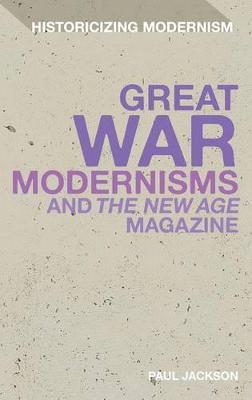The literary magazine The New Age brought together a diverse set of intellectuals. Against the backdrop of the First World War, they chose to write about more than modernist art and aesthetics. By closely reading and contextualizing their contributions, Paul Jackson's study engages with the political and philosophical responses of literary artists to modernity. Jackson demonstrates the need to interpret modernism not merely as an aesthetic phenomenon,but inherently linked to politics and philosophy. By placing the writing of a canonical modernist, Wyndham Lewis, against a figure usually excluded from the modernist canon, H.G. Wells, Jackson examines further a wartime modernism that embraced socialist and political views. This reinterpretation of modernism provides a historicised understanding of the politicised hopes of artists promoting revolutionary forms of cultural renewal. Considering modernist writers' relationship between politics,philosophy and aesthetics in the context of total war Jackson encourages new cultural-historical definitions of modernism.
In addition this study provides the first close analysis of cultural contributions from a leading wartime Little Magazine, tracing the radical modernist debates that developed in its pages.
- ISBN10 1441180087
- ISBN13 9781441180087
- Publish Date 12 July 2012
- Publish Status Active
- Publish Country US
- Imprint Continuum Publishing Corporation
- Format Hardcover
- Pages 192
- Language English
